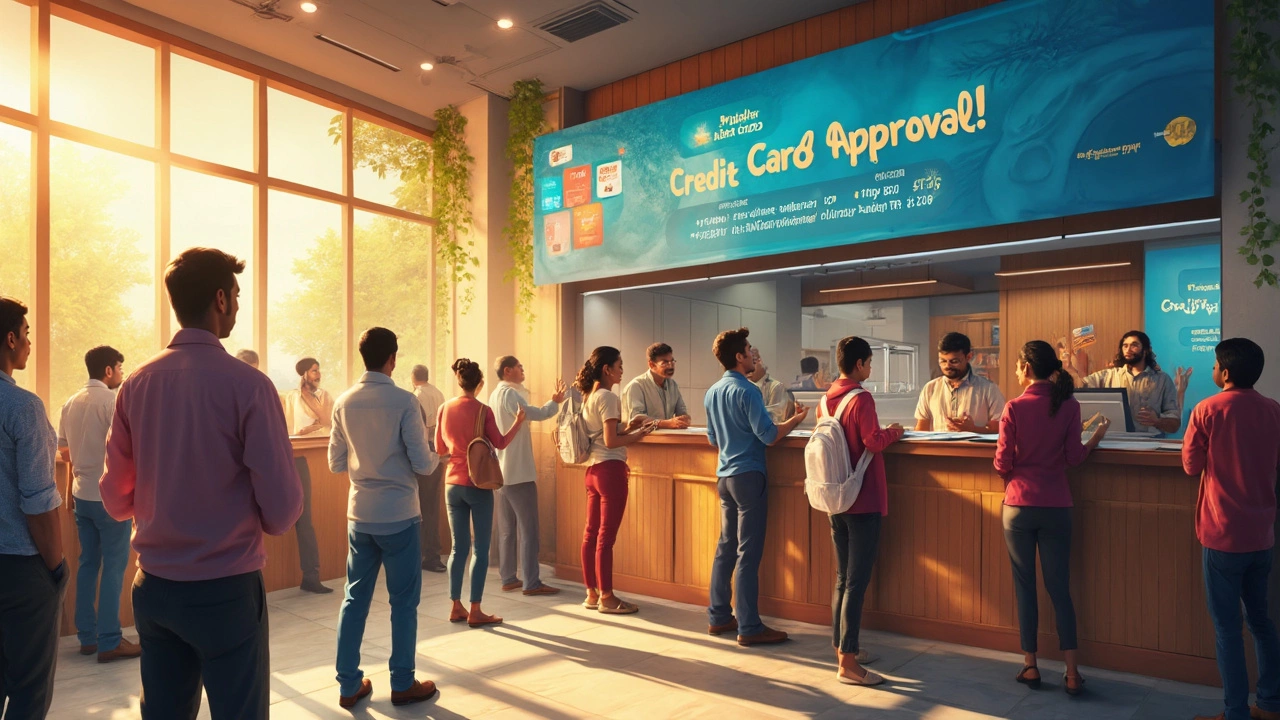 May, 23 2025
May, 23 2025
If you’ve ever wondered why one person seems to get approved for every credit card offer while someone else collects rejection letters, you’re not alone. Banks don’t all play by the same rules. Some are sticklers for perfect credit, while others are way more forgiving—even if you’ve made a few financial mistakes.
Right now in 2025, a few banks stand out for saying “yes” more often, even to people with low or average credit scores. This matters because your first credit card is like a golden ticket: it can help you build credit, unlock rewards, and handle surprises. But applying to every card under the sun isn’t the answer—it hurts your credit score and wastes time. You need to know which banks actually have your back if your credit isn’t spotless.
Let’s break down who’s known for easy approvals, what kind of scores they want, and how you can boost your chances—even if your financial history is a bit messy. The best part? You don’t have to guess which cards might work for you. Stick around and you’ll walk away with a game plan that saves frustration and helps you win at the approval game.
- Why Approval Varies by Bank
- Top Banks Known for Easy Credit Card Approval
- What Credit Scores Do They Actually Accept?
- Tips to Boost Your Approval Chances
- Alternatives If You Get Denied
Why Approval Varies by Bank
Banks and credit unions all have their own recipe for saying “yes” or “no” to credit card applications. It’s not just about your credit score; it’s about how much risk they’re willing to take and what kind of customers they’re after. Some banks love to snag new customers, even if their credit history isn’t perfect. Others, especially the big names, prefer folks who have already proven they can handle debt.
Let’s get specific. Capital One is famous for approving people with average or even low scores. They have cards like the QuicksilverOne and Platinum Mastercard that target first-timers or those rebuilding credit. Synchrony Bank and Discover also lean toward easier approvals on certain cards, while American Express and Chase usually want higher scores and more history before they’ll take a leap of faith.
Banks check more than just your three-digit credit number. They look at things like:
- Monthly income and how steady your job is
- Your debt-to-income ratio (how much you owe versus what you make)
- Past payment history with all kinds of loans, not just credit cards
- Number of recent credit inquiries (too many, and you look desperate)
Here’s a quick look at how some banks compare on credit card approval criteria as of 2025:
| Bank | Minimum Score for Basic Cards | Special Notes |
|---|---|---|
| Capital One | 580 | Known for beginner and rebuild cards |
| Discover | 600 | Student and secured cards are easier bets |
| Chase | 660 | Looks at 5/24 rule (limit on recent approvals) |
| American Express | 670 | Prefers established credit history |
| Synchrony Bank | 600 | Retail and store cards have higher approval rates |
The bottom line? If your goal is easy credit card approval, pick your target based on the bank’s reputation and the kind of card you apply for. Going with banks and products designed for lower scores gives you a much higher shot at getting in the door.
Top Banks Known for Easy Credit Card Approval
If you’re hunting for the easiest credit card approval, you want to focus on banks known for being a little less strict. Some big names keep popping up, especially in 2025, for giving people with fair credit or limited history a real shot. Here’s what you need to know about where your odds are best.
Capital One is probably the biggest name here. They have cards like Capital One Platinum and QuicksilverOne that regularly approve folks with average or even low credit scores. The requirements are simple: a steady income and no recent bankruptcy. Plenty of newcomers and people rebuilding credit have scored approvals with them.
Discover is another favorite, especially for their Discover it® Secured card. This card not only helps build or rebuild credit, but reports to all three major credit bureaus. Discover’s online pre-qualification tool is easy to use and doesn't mess with your credit score. Most applicants get a response in minutes.
For those who prefer credit unions, Navy Federal Credit Union has a rep for approving military families—even with lower credit. Their cashRewards and nRewards® Secured cards stand out. Credit unions like this tend to look at your overall relationship, not just your credit score.
If you want a card that almost anyone can get, look into OpenSky® Secured Visa. They don’t do a credit check at all. Approval is mostly about having enough to put down for the security deposit.
Here’s a quick look at some easy approval credit card options, the banks behind them, and typical approval requirements:
| Bank/Credit Union | Popular Easy-Approval Card | Minimum Credit Score | Notes |
|---|---|---|---|
| Capital One | Platinum Mastercard, QuicksilverOne | 580-600 | No annual fee or low annual fee; builds credit |
| Discover | Discover it® Secured | No set minimum for secured | Reports to all bureaus; graduation option |
| Navy Federal Credit Union | nRewards® Secured, cashRewards | 500+ | For military/family; flexible with low scores |
| OpenSky® | OpenSky® Secured Visa | No credit check | Just need a security deposit |
Some banks even let you check for easy credit card approval before you apply. Look for “pre-qualification” tools on their websites. They give you a good idea where you stand, and it won’t ding your score. Stick to these banks and options if your credit is shaky, and you’ll avoid most of the guesswork and disappointment.

What Credit Scores Do They Actually Accept?
This is where things get real. Banks aren’t as secretive about their minimum credit score requirements as they used to be, but there’s still a lot of confusion online. The truth is, not every bank—or even every credit card within a bank—wants the same kind of customer.
Here’s a quick breakdown of what you can expect from the big players:
- Capital One: They’re famous for approving folks with fair or even poor credit. Cards like QuicksilverOne or Platinum usually accept scores as low as 580. If you’re rebuilding, Capital One’s secured cards don’t even check credit in some cases.
- Discover: The Discover it Secured card is a top pick for people who are new to credit or repairing it. Most folks get approved with scores starting at 600, and sometimes even lower if you already have a bank relationship.
- Wells Fargo: Wells Fargo Active Cash and Reflect cards tend to like applicants with at least 670, but their secured card goes down to around 560 for motivated newbies.
- Chase: If your score is below 670, Chase cards are usually a no-go. They're a bit pickier, aiming for folks in the “good” range or higher.
Your odds are best if your score is over 600, but even in the 500s, you’ve got a shot with the right cards. The real sweet spot for easy credit card approval is usually 580 to 640 for beginner and secured cards. Just remember, actual approval isn’t just about the number—it also depends on your income, debts, and recent applications.
Quick tip: Don’t trust random internet comments saying “I got a $5,000 limit with a score of 540!” That’s the exception, not the rule. Always check the bank’s own criteria, read recent cardholder reviews, and use prequalification tools before applying so you don’t ding your score for nothing.
Tips to Boost Your Approval Chances
Banks aren’t giving out credit cards at random. They’re checking a handful of things—and if you nail those basics, you’re way more likely to get an approval instead of that dreaded rejection email. Here’s the real-world game plan:
- Check Your Credit Report (First Step, Always): Head to Experian, Equifax, or TransUnion and pull your free report. Hunt for mistakes—wrong accounts, old debts you’ve paid, or someone else’s late payment showing up. Fixing an error can bump your score overnight.
- Pay Down Balances: Credit utilization (the percent of your available credit you’re actually using) is a huge deal. Experts say keep it under 30%. If you’re using $1,200 of a $2,000 limit, try to bring that balance down below $600 before you apply.
- No Missed Payments in the Last Year: Banks care a lot if you’ve paid bills on time—just one missed payment can tank your chances. Set up automatic payments so nothing slips through the cracks.
- Start with a Beginner or Secured Card: If your credit score isn’t great, go for a secured or beginner card. These cards are designed for folks building (or rebuilding) their credit, which means approval odds are a lot better.
- Keep Applications Low: Every time you apply for a new card, your credit takes a tiny hit. Racking up 4 or more applications in 90 days is a red flag to banks, so keep it to 1-2 cards at a time.
Here’s a quick look at what banks look for before giving the green light on easy credit card approval:
| Approval Factor | Why It Matters | Ideal Range/Tips |
|---|---|---|
| Credit Score | Shows how risky you are as a borrower | Above 580 for most easy-approval cards |
| Payment History | Recent late payments make banks nervous | On-time bills for 12 months |
| Credit Utilization | High balances signal risk | Below 30% is best |
| Recent Hard Inquiries | Too many means you look desperate | Keep to 1-2 in the last 6 months |
| Income | Higher income makes banks more comfortable | Be honest—don't exaggerate |
If you’re rebuilding credit, also think about becoming an authorized user on someone else’s card (like a parent or spouse with good habits). Their on-time payments can help your score, without you needing to actually spend on their card. And don’t forget: a no annual fee card is a safer way to start, since there's less pressure to use the card just to justify the cost.

Alternatives If You Get Denied
A rejection from a bank stings, but it’s not the end of the road. Tons of people get denied every year, especially if their credit history is shaky. The good news? You’ve still got options—some of them can even be better for building credit than a regular card.
- Secured credit cards are the top pick here. Banks like Discover and Capital One almost always approve folks if they can put down a refundable deposit—think $200 to $500. You use it just like a regular card, and your responsible payments show up on your credit report. After 6-12 months, many banks review your account for an upgrade to an unsecured card and return your deposit.
- Consider becoming an authorized user on a friend or family member’s credit card. If their account is in good standing, their history can help beef up your score. Just make sure they’re responsible; you don’t want someone else’s late payments trashing your credit.
- Credit-builder loans might sound weird, but they work. Credit unions and some smaller banks offer these: you make monthly payments, and at the end, you get your money back (minus a little interest). It’s an easy way to show you can handle payments and get those on-time marks added to your report.
- Some fintechs and neo-banks (think Chime, Varo, Self) offer starter credit cards or “credit builder” products with no hard credit check. The catch? They often require you to open a spending or savings account first. These are growing fast in 2025 as more people want simple ways to build credit.
Here’s a quick cheat sheet on popular options and approval rates:
| Alternative | Estimated Approval Rate | Requires Credit Check? |
|---|---|---|
| Secured Credit Card (Discover) | ~85% | Yes (soft/hard) |
| Authorized User | Nearly 100% | No |
| Chime Credit Builder | 90%+ | No |
| Self Credit Builder Loan | ~95% | Yes (soft) |
Whichever route you choose, make your payments on time—that’s the key to getting future approvals. And if you go the secured card or credit builder route, check that the lender reports to all three bureaus (Experian, Equifax, TransUnion). That way, your hard work actually gets noticed by other banks the next time you apply for the easy credit card approval you’re after.